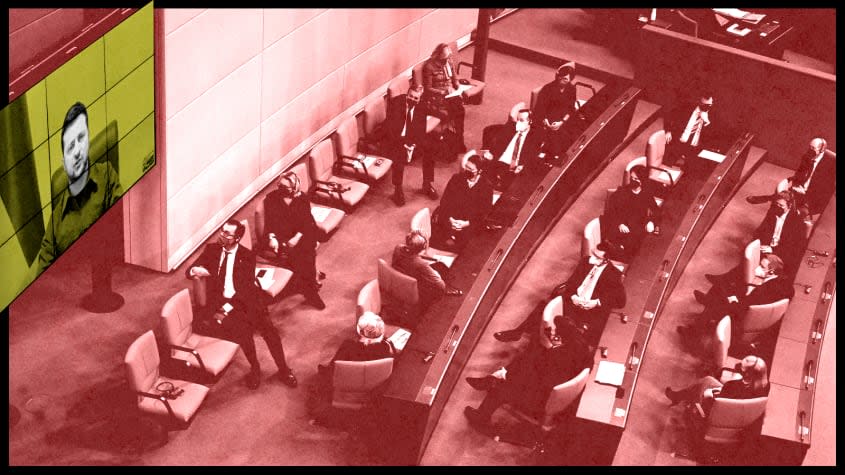Germany's parliament heard Zelensky. Then it voted on birthdays.

- Oops!Something went wrong.Please try again later.
Continuing his virtual tour of Western capitals, Ukrainian President Volodymyr Zelensky addressed the German Parliament in Berlin Thursday morning. The Bundestag is not known as an exciting place under normal conditions, yet, if anything, the circumstances were even more dramatic than of Zelenky's appearance before Congress: Proceedings were briefly delayed, apparently because a rocket attack on Kyiv interrupted the video link.
The tone of Zelensky's speech was different from his U.S. remarks, too. While he called America to realize its ideals, Zelensky chided Germans for shirking their responsibilities and re-enacting a painful past. Appealing to German's recent history of communist rule and national division, Zelensky insisted Nord Stream 2, the controversial gas pipeline that connects Russian and Germany "is a weapon." "You always said, 'It's business, business, business,'" he continued, but Ukraine knew better. Now, Zelensky concluded, Ukrainian and other critics had been proved right: The pipeline was "cement for the wall" separating free Europe from the zone of Russian domination, and German opposition to European Union membership for Ukraine was yet "another brick."
As in Congress, Zelensky received sustained applause from his audience. But after brief parliamentary maneuvering, the Bundestag quickly returned to its scheduled agenda, which included official recognitions of birthdays and instructions on mask wearing. The contrast between the gravity of Zelensky's speech and the apparent indifference of the Bundestag is playing badly in the German press. It also suggests German politicians are far from ready for a permanent defense policy shift — let alone war.
Berlin's response has not been altogether indifferent, of course. In a surprise move earlier this week, the German government announced it would buy 35 F-35 jets from the United States, part of a broader effort to reach NATO's 2 percent target for military spending by member states, but also to better integrate with U.S. and other member forces. Yet there's a difference between promising money for planes that won't be delivered any time soon and intervening in a conflict that's already underway and unlikely to end in the near term even if the bombs stop falling for a time.
Despite the memories of the Berlin Wall which Zelensky tried to raise, geopolitical conditions don't change overnight. Germany's drift toward more active participation in the Western alliance is a development to be welcomed. But Germans still face looming dilemmas about their priorities in a world where civilizational blocs threaten to replace the undifferentiated global order of post-Cold War imagination. Germany won't be able to stay on its preferred agenda forever. Zelensky, the U.S., and Germany's European allies should keep up the pressure.
You may also like
Russian state propagandists laugh at new 'correspondent' Tucker Carlson in Colbert sendup
The Senate just voted to abolish Standard Time and make Daylight Saving Time permanent
Trevor Noah disturbed by Kanye West's harassment of Kim Kardashian: 'Terrifying to watch'

